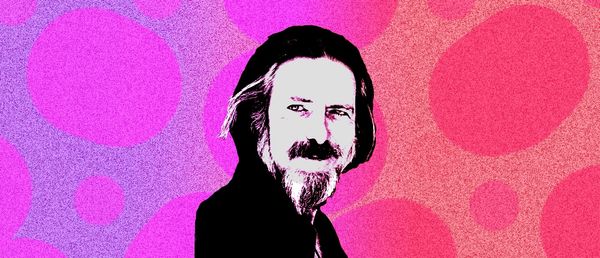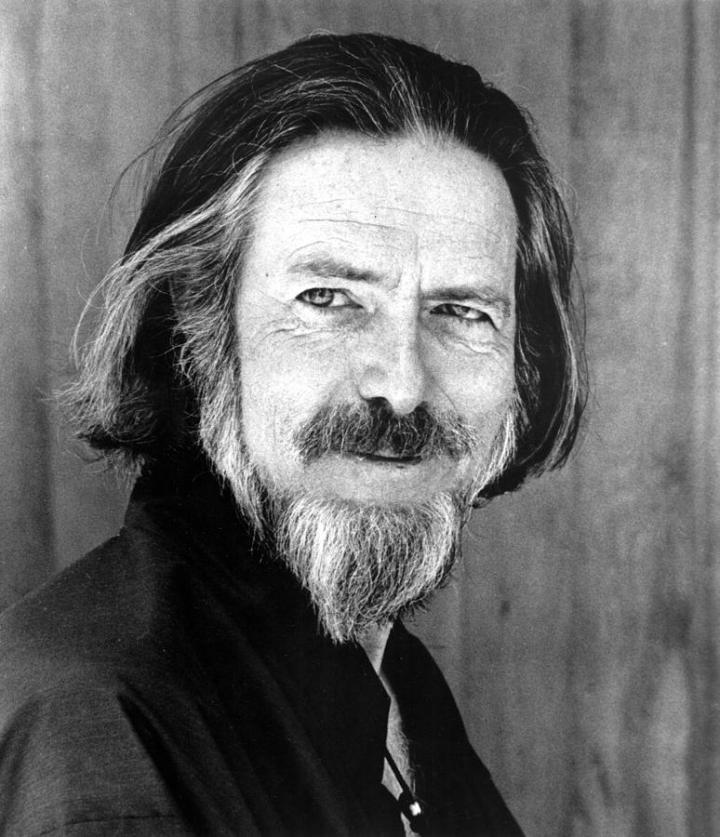Jordan Bates • • 6 min read
Alan Watts’ Jaw-Dropping Explanation of Mankind’s Deepest Nature

“Billions of years ago, you were a big bang, but now you’re a complicated human being. And then we cut ourselves off, and don’t feel that we’re still the big bang.”
— Alan Wilson Watts, 1915–1973

Alan Watts hardly needs an introduction.
For anyone who has ventured at all into the world of philosophy and spirituality, Watts is likely to be a household name.
In case you’re unaware, he was a British philosopher, writer, speaker, and one of the most iconic popularizers of Eastern philosophy in the Western world.
For many of us, ol’ Alan was our first “guru” figure, helping us see the world through new eyes and expanding our understanding of ourselves with his inimitably eloquent expositions.
Alan filled this role for me, at least, and I’ll forever love him for all of the things he taught me.
Here at HighExistence, we’re colossal fans of Mr. Watts. We’ve shared his powerful relationship advice; five of the greatest videos featuring his work; a collection of his most profound quotes; and one of his most marvelous essays on Zen.
Building on that legacy, today we’re going to share a lesser-known passage of Watts’—an explanation of mankind’s deepest identity, taken from one of his lectures.
If you prefer, you can scroll past the text transcript to watch a video version. Soak these words in slowly. View them as a gift. Prepare yourself to absorb a veritable mountain of wisdom.
Alan Watts’ Magnificent Explanation of Human Nature
“Astronomers… say there was a primordial explosion, an enormous bang billions of years ago which flung all the galaxies into space. Well let’s take that just for the sake of argument and say that was the way it happened.
It’s like you took a bottle of ink and you threw it at a wall. Smash! And all that ink spread. And in the middle, it’s dense, isn’t it? And as it gets out on the edge, the little droplets get finer and finer and make more complicated patterns, see?
So in the same way, there was a big bang at the beginning of things and it spread. And you and I, sitting here in this room, as complicated human beings, are way, way out on the fringe of that bang. We are the complicated little patterns on the end of it. Very interesting.
But so we define ourselves as being only that. If you think that you are only inside your skin, you define yourself as one very complicated little curlique, way out on the edge of that explosion. Way out in space, and way out in time.
Billions of years ago, you were a big bang, but now you’re a complicated human being. And then we cut ourselves off, and don’t feel that we’re still the big bang. But you are. Depends how you define yourself. You are actually—if this is the way things started, if there was a big bang in the beginning—you’re not something that’s a result of the big bang. You’re not something that is a sort of puppet on the end of the process. You are still the process. You are the big bang, the original force of the universe, coming on as whoever you are.
When I meet you, I see not just what you define yourself as—Mr. So-and-so, Ms. So-and-so, Mrs. So-and-so—I see every one of you as the primordial energy of the universe coming on at me in this particular way. I know I’m that, too. But we’ve learned to define ourselves as separate from it.”
An Excellent Video Version of This Monologue
Here’s an awesome video that combines the original audio with some music and video in a pretty delicious way:
A Brief Critique of the Monist Worldview
There is a common bastardization of Alan Watts’ worldview that I think needs to be called out more often.
Much of Alan Watts’ work can be misinterpreted as an eloquent attempt to teach his listeners that “All is One,” that “you are the universe,” that boundaries do not actually exist. Many spiritual teachers of Alan Watts’ time and the post-Watts era have espoused versions of this idea.
Watts himself, however, in his more nuanced discussions of his topic, always emphasized that human beings are continuous with the universe. That is, we do have individual existences, but we also can’t be separated from the entire process. Watts said:
“You are an aperture through which the universe is looking at and exploring itself.”And on another occasion:
“You are a function of what the whole universe is doing in the same way that a wave is a function of what the whole ocean is doing.”This seems to put him in a camp similar to the late Carl Sagan, who posited that we are “a way for the cosmos to know itself.” But others took a more extreme view, holding that you simply are the entire universe, and your individual existence is something to be regarded as a persistent delusion. In philosophical terms, this position is known as monism, which can be contrasted with dualism—the view that reality contains unambiguously separate objects.
Prior to the countercultural era of the 1960s, the Western world had for many centuries been fairly heavily entrenched in the dualist point of view. Alan Watts and others rebelled against this status quo, calling attention to the interconnectedness of all things and the ambiguous nature of the boundary between the self and reality.
The fatal flaw of some of these teachers was that in rebelling against dualism, they swung the pendulum too far in the opposite direction, embracing pure monism. If you’ve ever had the intuition that there is more to the story than “All is One,” you’ve detected the problem with monism: It fails to recognize the specifics of the world, the uniqueness of individuals, and the most basic thing “common sense” tells us about ourselves: that we are, at least in some sense, distinct from everything else. In a poignant critique of monism, cognitive scientist David Chapman writes:
“If All is One, then there is no boundary, and you are really the entire universe. Typically, monists say that the universe is equivalent to God, so you are actually also God. As you realize everything is totally connected, you develop the ability to affect anything you want.
This is the ultimate fantasy of power and invulnerability. However, convincing yourself that you are All-powerful, when you aren’t, does not make your life go well.
When the fantasy collides with reality, monists retreat into a make-believe magical world. Monism produces dreamy spaciness, refusal to make any clear distinctions, refusal to judge. This leads to drifting through life, expecting other people to clean up your messes, contributing nothing except spiritual clichés mouthed at unwanted times.”
Chapman suggests that both monism and dualism are incorrect and proposes a “complete stance” called “participation” that combines the correct aspects of both monism and dualism. He defines “participation” as follows:
“Participation is the stance that revels in the extraordinary variability of the world, that loves and engages with specifics and individuals; and also appreciates the porous self/other boundary, works skillfully with diverse connections, and accepts responsibility for whatever you encounter.”
Watts seems to have espoused a view quite similar to what Chapman is calling “participation.” You are an inextricable portion of the reality-process that may or may not have begun with the Big Bang. You are comprised of the same atoms as everything else. In some sense, you are the universe. But in another sense, you’re definitely you, distinct from everything else.
To the extent that various teachers and gurus tangential to Watts insisted that we are all simply the universe and nothing else, I would argue that they were wrong. In their excitement to embrace “All is One,” they overlooked the valuable aspects of dualism: that boundaries do exist, and that this allows for individuality and for the game of human existence to occur.
Watts was one who boldly challenged the dominant dualist model of reality which he inherited, urging humanity to notice interconnectedness and the porous, ambiguous boundary between self and other, self and world. This work was decidedly important—an antidote to Western intoxication with the idea of total separation. And to Watts’ credit, he was quick to understand the nuanced truth that monism and dualism are both true, in some sense.
Thank you, Alan Wilson Watts, for existing and for teaching us to feel a lot less alienated in a vast, unfathomable universe.
If you’re interested in building self-mastery, take our new course, 30 Challenges to Enlightenment.

Jordan Bates
Jordan Bates is a lover of God, father, leadership coach, heart healer, writer, artist, and long-time co-creator of HighExistence. — www.jordanbates.life


![Seneca’s Groundless Fears: 11 Stoic Principles for Overcoming Panic [Video]](/content/images/size/w600/wp-content/uploads/2020/04/seneca.png)







